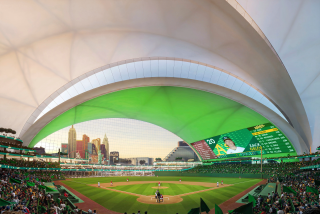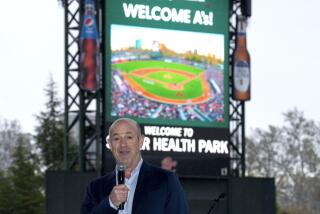Bud Selig’s time is running out to solve stadium issues in Anaheim, Oakland
The Bud Selig farewell tour is about to hit Southern California, with stops in San Diego and Anaheim this week and Dodger Stadium next week. In the five months before he officially hands the commissioner’s gavel to Rob Manfred, there will be no shortage of debate about what Selig did that worked well, and what he did that did not work out so well.
Selig likes to cite the 22 ballparks that opened during his tenure. As he visits California, however, he can see that the ballpark situations in Oakland and Anaheim might well go unresolved before he leaves office.
Oakland first, for that is the drama into which Selig inserted himself, front and center. In 2009, when the Athletics lobbied for a new ballpark in San Jose, Selig told the A’s to stand down and let him handle it.
With the San Francisco Giants refusing to surrender their territorial rights to San Jose, Selig appointed a committee to “thoroughly analyze all of the ballpark proposals.”
Said Selig at the time: “The A’s cannot and will not continue indefinitely in their current situation.”
The A’s have continued in their current situation for the last five years, and last month signed a lease extension that could keep them in their current situation, in decrepit O.co Coliseum, for up to 10 more years.
The committee essentially has disbanded, without any public report of its findings. The committee has not done any significant work in the 14 months since San Jose filed suit against Major League Baseball, and Manfred has emerged as baseball’s point man in the A’s stadium saga, according to three people familiar with the matter but not authorized to discuss it.
Lew Wolff, the A’s co-owner and managing partner, has agreed to consider building a ballpark in Oakland, a concept he dismissed years ago as not feasible.
“If you landed in the Bay Area today and you did not want to disturb the Giants, and I really appreciate what they have accomplished, would it be Oakland, would it be San Jose?” Wolff said. “We want to give that another look.”
He has no choice for now, since MLB would not consider San Jose so long as the city continues to challenge the league in court. But one person familiar with the work done by Selig’s committee said the San Jose ballpark proposal is not nearly the slam dunk the city considers it to be.
“I got more straightforward answers out of Oakland than I did out of San Jose,” the person said.
All San Jose wanted out of MLB was an answer on whether the A’s could move. If MLB wants to rid itself of the suit, it might consider giving San Jose an answer.
Selig persuaded the A’s not to demand a vote of the owners, but he’s gone in five months. The A’s could use that time to prepare shiny feasibility studies for Oakland and San Jose, then ask the owners to decide whether all 30 teams would make so much more money with the A’s in San Jose that the Giants’ territorial rights should be overturned.
“If the fact of life is that we can’t do something, we need to know that,” Wolff said. “I’m convinced, the day after a vote, the sun will come up anyway.”
Wolff has led the Athletics’ quest for a new ballpark for more than a decade, even before he and his partners bought the team. Since he wrote off an Oakland site years ago, would he consider a new ballpark there a defeat?
“I wouldn’t look at it that way,” he said. “We’re looking for a better fan experience in the Bay Area, wherever we place it.”
Angels owner Arte Moreno is looking for a better fan experience too, either in a renovated stadium in Anaheim or a new ballpark elsewhere in Orange County.
We are 10 days shy of the one-year anniversary of what appeared to be the resolution, a tentative agreement in which Moreno would pay for the estimated $150 million in Angel Stadium renovations and would get the right to try to make his money back from developing the surrounding parking lot, at no cost to the city of Anaheim.
Mayor Tom Tait objected, saying the parking lot was too valuable to lease to Moreno at $1 per year. A subsequent appraisal commissioned by the city valued that land at $225 million.
But the appraisal also valued the land at up to $325 million if the stadium were demolished, and Moreno was agitated that the city would assess that option if it were intent on keeping the team.
There have been no negotiations since the appraisal was released in May, and the Angels have considered sites in Tustin and Irvine, with the Tustin site currently considered the most feasible alternative.
The Angels have feared the lease talks would get held up by the November election, in which Tait and three of the other four City Council members are running. After all, who would vote for an Angels deal now, only to have Tait and his allies accuse you of a taxpayer giveaway at election time?
“I’d be willing to put my political career on the line,” City Councilwoman Kris Murray said, “to make this happen for the city. The team is more important than any one election. We can get the agreement done.”
Moreno already has four of the five City Council votes, if the council cares to vote before the election. The Angels have agreed to share profits from any development. There is a deal to be made here, if the City Council cares to stand up and make it.
On his visit to Anaheim this week, perhaps Selig can stop by City Hall. On his way out as commissioner, maybe the last ballpark deal he could broker could be the one in Anaheim, not Oakland.
More to Read
Go beyond the scoreboard
Get the latest on L.A.'s teams in the daily Sports Report newsletter.
You may occasionally receive promotional content from the Los Angeles Times.







